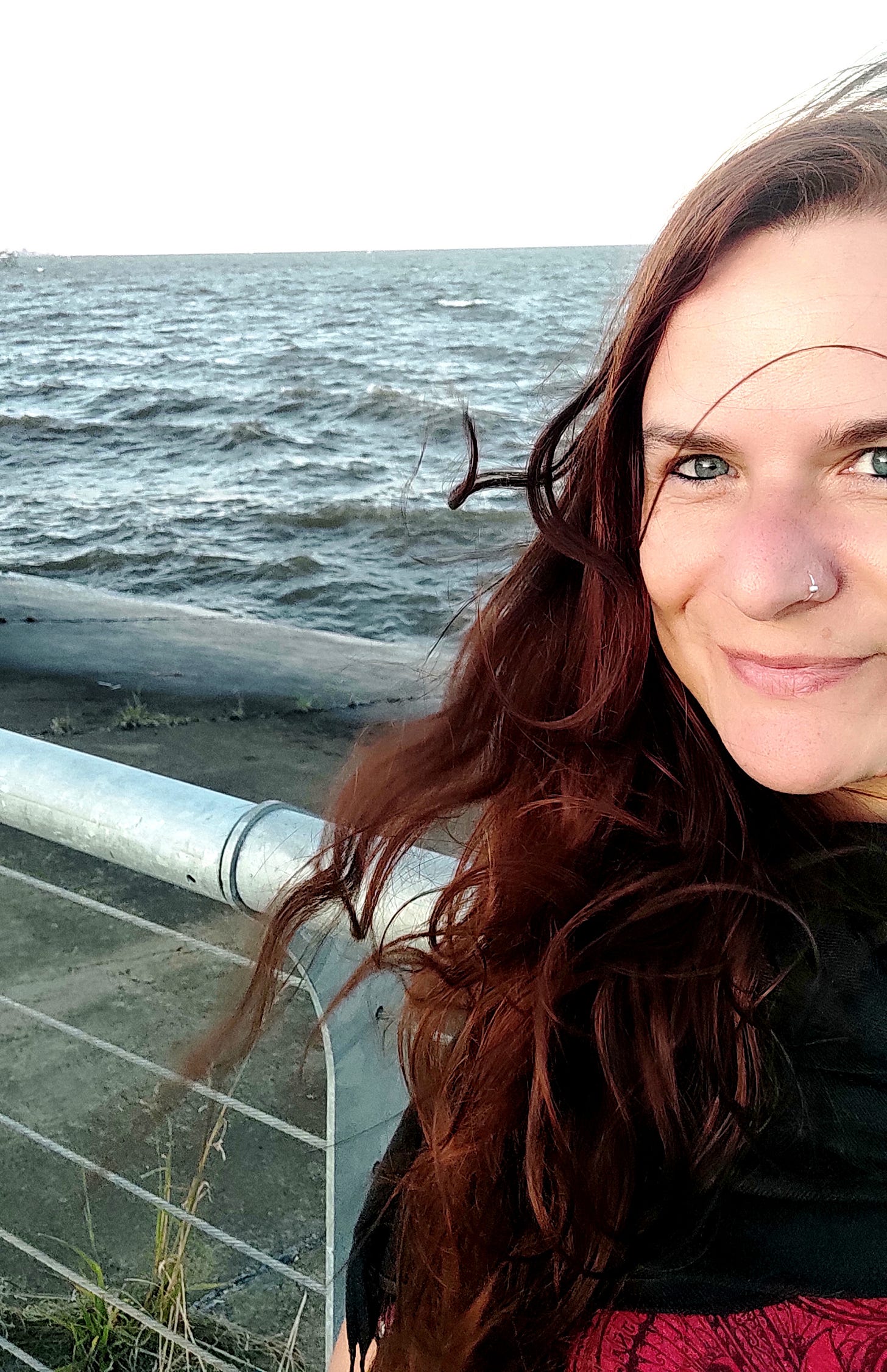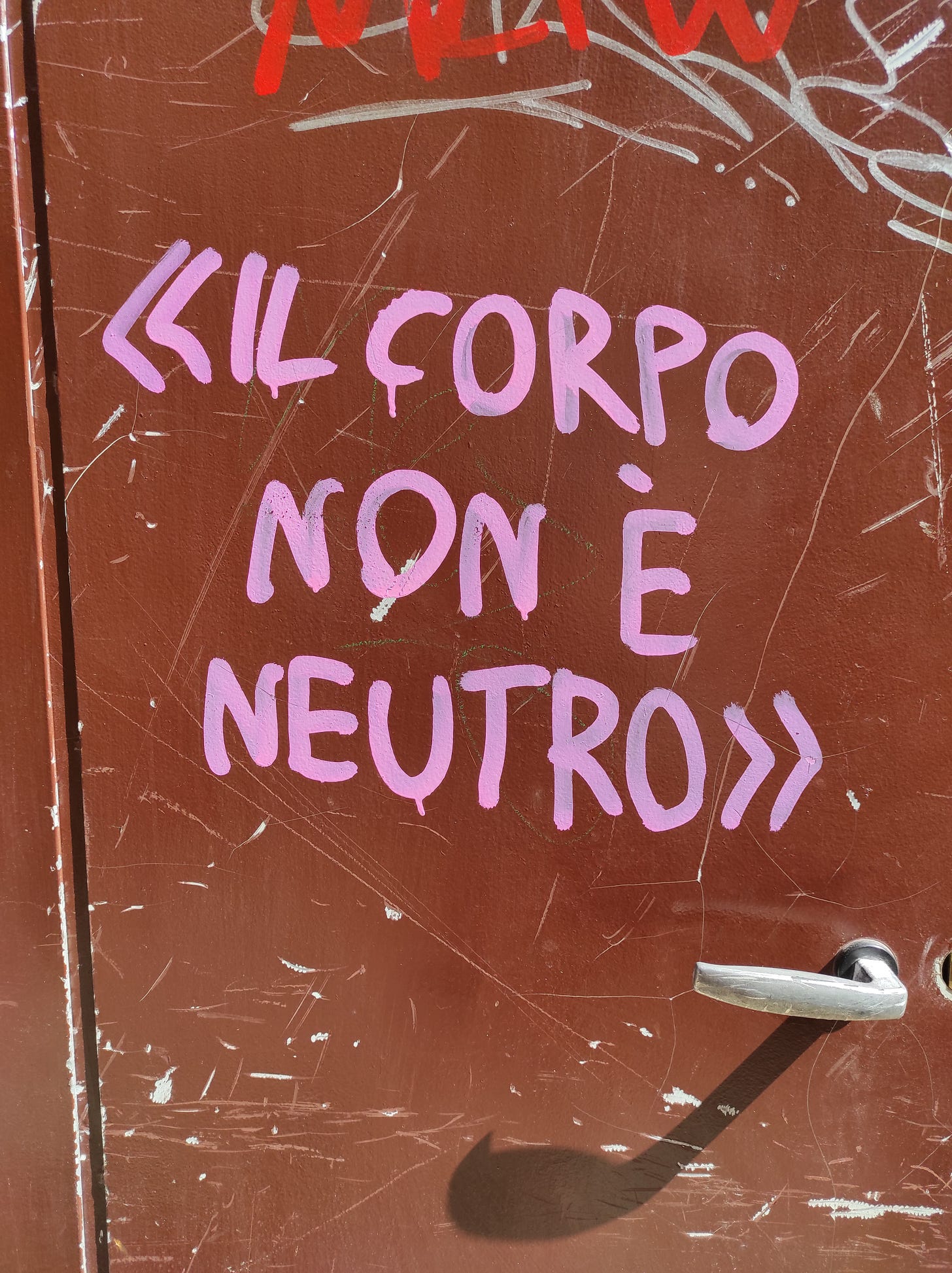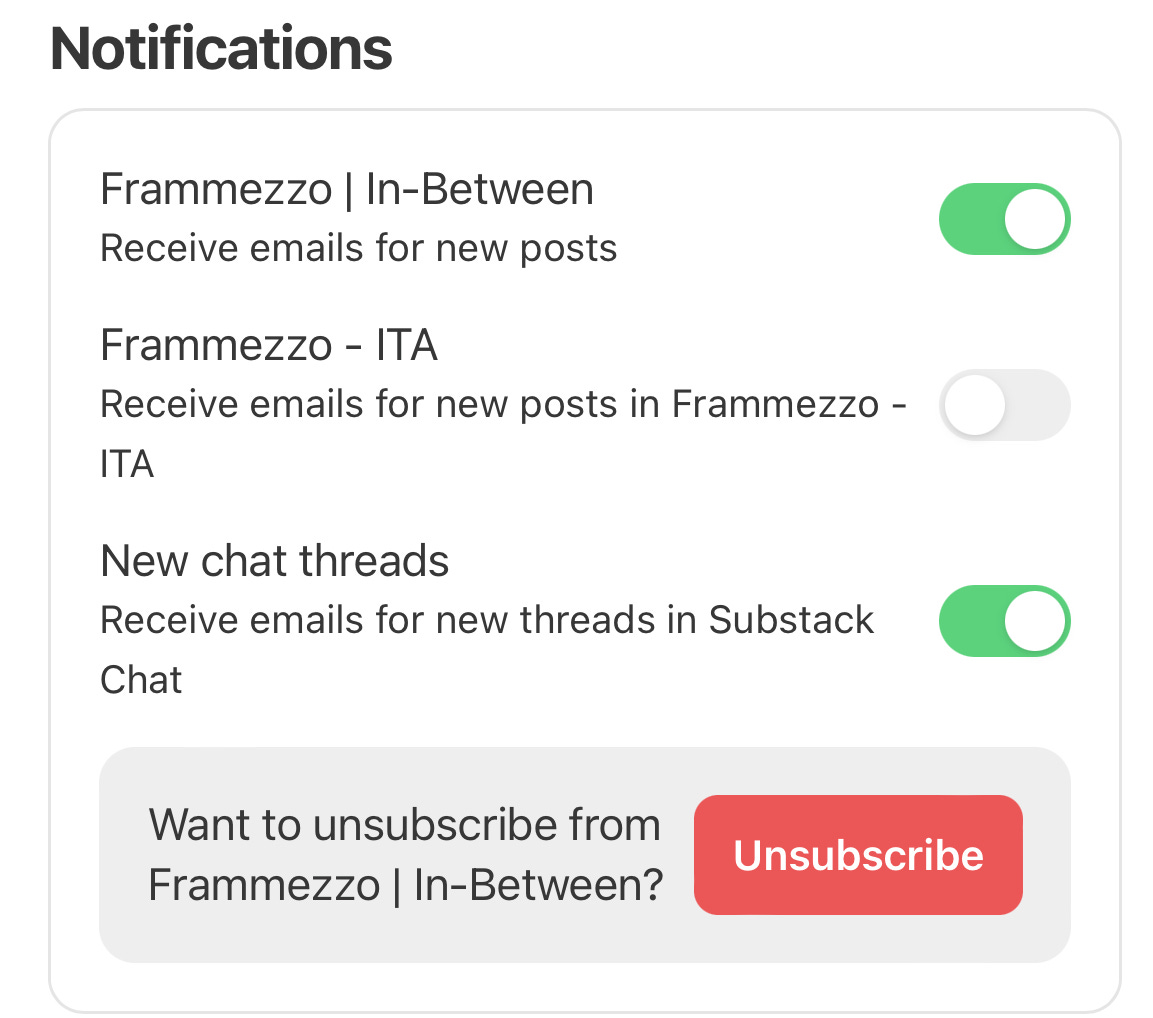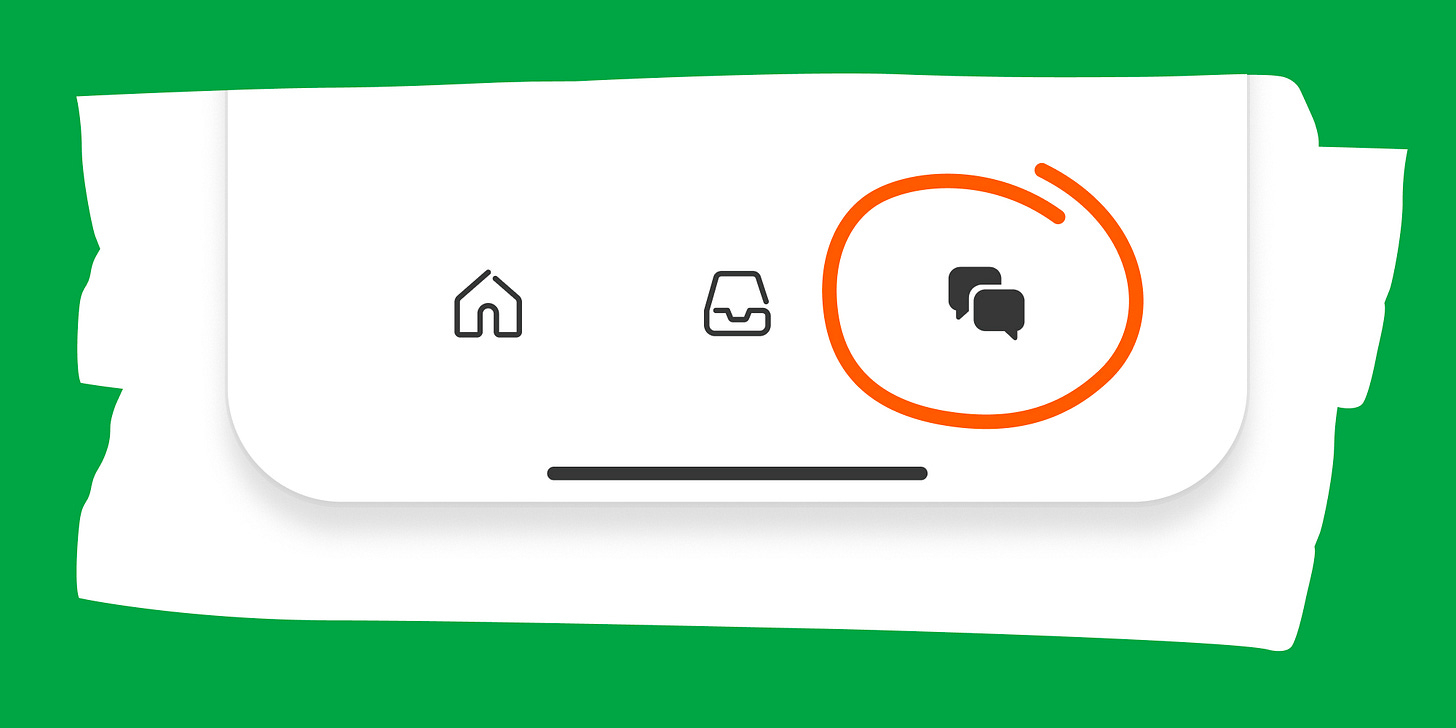Paola's journey - from Milan to Barcelona, via Istanbul, Vienna and Buenos Aires
Life in the Frammezzo #4 - Paola Natalucci
To read this post in Italian click here.
The December interview of Frammezzo takes us into the life of Paola Natalucci, wonderful author of Catrame & Libertà newsletter and a long-time explorer of in-between spaces.
I met Paola here on Substack and immediately admired the wave of insights and reflections that land in my inbox every two weeks through her writing (and sometimes voice, via podcast). I thank her for the generosity she showed during our chat, and also for her trust.
Get ready for a very exotic yet familiar journey through Spain, Southeast Asia, and Turkey.
Happy reading!
Paola engaging in photosynthesis under the sun of Barcelona and of Milan
Paola, what shape does your In-Between take?
My Frammezzo is super fluid and ever-changing. It has evolved a lot over the years, but somehow, it’s always been there.
I’ve been living in Barcelona since 2018, and, for me, this city feels like home, just like Milan, where I was born.
I have to add an extra layer to my In-between though—my partner is from Argentina. Sometimes we head there for a few months and, in Barcelona, we’re surrounded by a lot of Argentinians, so I often feel immersed in their culture.
But living in that In-between space has always been part of who I am.
Two weeks after graduation, for example, I packed up and moved to Istanbul for an internship. Turkey totally changed my life, especially because I met so many women there traveling solo—not just in Europe but all across the Middle East. It opened my eyes and my heart.
Then came Austria—I was with an Austrian guy for eight years, living in Vienna for three of those. And even Thailand—I spent four years living in Bangkok.
What led you to live in the In-Between?
I didn’t leave Milan because I was unhappy. I’ve always loved Milan—it’s a city that has given me loads of cultural opportunities. But right before I turned 23, I lost my dad to illness. And shortly after finishing my studies, my ex passed away. Suddenly, Milan felt like a city full of ghosts.
So, I took the leap and moved to Istanbul for an internship. Going to Turkey was like a breath of fresh air—it felt like I could finally breathe again. Being somewhere else also gave me this huge sense of freedom, especially because I really needed to feel disoriented, and Istanbul gave me exactly that: I didn’t speak Turkish, didn’t know anyone, and was still processing my grief.
Istanbul became my first big Frammezzo. I was stuck in between the life I had before and the life after. And that city helped piece me back together, giving me a whole new identity. Suddenly, I wasn’t “Paola, the girl whose dad had died,” but I was “Paola, the Italian girl who had just arrived.”
Since then, I’ve linked the idea of ‘rebuilding’ with the concept of being away from my roots. My ‘wind energy’ then took me all over the place, but when I landed in Barcelona, the Mediterranean really slowed me down, and I stayed.
EN To know more on the concept of Frammezzo as the redemptive phase of grief, read my November post.
Practically speaking, how does your life in the In-Between work? The obvious questions that come to mind hearing your story are: where do you live? Where do you sleep? Do you have a fixed setup, or does it vary based on circumstances?
Paola while catching the sudestada wind in Buenos Aires
In Barcelona, I felt the need to settle down and really connect with the place I live in. Recently, my partner Martin and I bought a house together.
I also usually go back to Milan every two or three months to visit my mum, unless something comes up—like this year when my grandma was unwell, so I went back more often. I like to stay in Milan for at least a week when I go, because it’s important for me to see family and friends, but also to carve out some alone time in my city.
Then, in Winter, we sometimes spend a few months in Argentina with Martin’s family. But in 2024, we switched it up and lived in Southeast Asia for four months instead.
Honestly, I think this will be my last stint as a so-called ‘digital nomad’ because I found it really stressful to travel while working. My job ended up taking too much mental presence away from the places I was in.
Instead, I find the In-between lifestyle much more fulfilling. In my life, instead of constantly hopping from one place to another every few weeks, I’ve lived in different places for years, and I’ve always felt better that way.
What’s your typical week like?
It depends on how my two jobs are shaping up, but I always try to keep Monday mornings and Friday afternoons free.
I live in the In-between professionally too. In addition to being a copywriter and ghostwriter, I’m also a language coach—and I don’t call myself that just because ‘teacher’ doesn’t sound as cool.
I teach foreign languages to adults, and at first, this job was kind of a shock for me. Learning a language as an adult brings a lot of personal baggage with it: it can be an emotional journey, and sometimes it’s about overcoming psychological blocks, limiting beliefs, and even personality traits that get in the way of achieving your goals.
I’ve had students tell me: “I’ve always thought I could never learn English because…” and then adding many different traumatic experiences like, “The teacher told me I was hopeless” or “I’m an introvert and can’t speak in front of people, even in my native language!”
So I decided I needed to arm myself with tools to help my clients the best I can, like coaching techniques.
Overall, during the course of the week, I try to slot all my calls into three days. The time I don’t spend on calls I use for different things: creating asynchronous work materials; planning client sessions; working on marketing my business; studying (because I think it’s important to keep growing if I want to help others grow); and writing—whether it’s for my copywriting clients or for these newsletters.
Can you highlight any specific benefit that living in the In-Between has brought to your life?
It has given me so much richness—though not financial richness, because as I always say, richness doesn’t just come in one form.
I’ve always worked, and while money is important to talk about, the real focus should be on why that is important: money is a means to give you choices, to allow you to decide what’s best for you.
For me, the richness of living in the In-between has been to nourish my soul: it’s made me multilingual, for example. I can now read and speak in Italian, French, English, German, and Spanish. Over the years, I’ve also picked up some Turkish and Thai, which were super useful during specific periods of my life.
On top of that, living in the Frammezzo has thrust me into intercultural mediation. One day, I wasn’t just another Italian in Milan; I was a foreigner in another country. Turkey, Southeast Asia, and even Austria taught me that everything is relative—especially what’s often passed off as ‘universal’ on a social and cultural level.
The biggest benefit the Frammezzo gave me was the knowledge that I don’t know it all—and I’m totally okay with that.
Paola and Theo, a dear friend who visited all her In-Between spaces
In building this lifestyle, have you had to deal with any prejudice? Has anyone not understood your life choices?
Not really. I’ve been lucky enough to always have a welcoming environment around me, and I’ve worked hard too to create that space. I guess, over the years, I’ve lost touch with some people though—not because of prejudice, but because it’s not always easy to maintain friendships from afar.
At first, it stung, especially with friends who I felt weren’t putting much effort into our relationship. But eventually, I took a more Taoist approach: there’s no point in holding grudges—relationships fade, and that’s okay. That being said, now that I’m 42, I can confidently say that those who are meant to come back into your life will, eventually.
Do you think building a tailor-made life and being able to follow personal inclinations is the exclusive prerogative of those born within a certain economic privilege? It’s not easy for everyone to imagine your lifestyle.
Privilege comes in many forms and shapes. I know people who have managed to build a custom life even without strong economic privilege to start with.
One of my dear friends, for example, came from a very humble and closed-minded background—her own sisters are still “stuck” in that mindset. But she broke the mold: she studied, left home, and worked hard to start a career that allowed her to grow beyond all her expectations, personally, professionally, and also financially.
Building a life tailored to you often means breaking free of mental and cultural frameworks. Sometimes, freedom can feel like being lost, and that’s not something everyone enjoys—probably, no one enjoys it. But some people never stop pushing toward the unknown.
In the end, it’s all about choices and priorities, as much as possible. When I was little, my parents told me their top priority as a family was to travel—and to do that, we had to give up other, more material things. They both worked hard and chose how to spend their money.
I’m grateful for that, because they raised me in a way that I’ve taken and made my own.
Have you ever considered giving up life in the In-Between?
I’d say no. The In-between has become an integral part of who I am. My home is me and how I interact with the places I live in. Maybe that’s the key: I left when I was in my early twenties, and it forever changed my concept of home—it’s simply not just one place.
Even though I’m based in Barcelona now, and I feel good here, I know I’ll always have the urge to move to somewhere else for a while—whether it’s for a long or short time, and if I can.
A writing seen by Paola on a door in Venice and never forgotten since: ‘Body is not neutral’. Sometimes we forget the body, yet the body always knows.
Was there someone or something that inspired you to pursue this lifestyle?
I think that traveling a lot since I was a kid has been my biggest inspiration. That’s why I’ve always read a lot of travel literature. I would say that the writer Elif Shafak (on Substack with Unmapped Storylands with Elif Shafak), with her life straddling the United States, England, Turkey, and Spain, has influenced me a lot.
When her novel The Bastard of Istanbul came out, I was living in Turkey. That book left a lasting impression on me, one that I still feel strongly to this day.
Did you know, before this conversation, that you were living in the In-Between?
I’d say… sort of, because I didn’t call it that.
But I knew that the Frammezzo was inside me, in the form of all the different versions of ‘me’ who have lived in Thailand, Vienna, and the other places I’ve called home over the years.
What advice would you give to someone interested in exploring life in the In-Between more consciously?
I’d recommend reading an essay: Orientalism by Edward Said. It’s not a light book, but it really struck me when I read it in university.
Said advises us to put aside the assumption that what we know and the way we live are necessarily ‘right’, because that attitude will only lead to constant dissatisfaction.
In general, especially if you feel the desire to explore a different place, I’d suggest going there with the attitude of ‘traveling towards’ something, instead of ‘escaping from’ somewhere or someone.
Being at peace with your primary roots, the place you come from, is probably the most important ingredient to be happy wherever you go, and even more so in the places you decide to settle in.
That’s what happened to me in Barcelona. In-Between also means stopping somewhere and, at the same time, accepting that you need to stay connected with all the other parts of your identity.
Will you help me?
Do you know someone (or maybe it's you!) who lives across two (or more) different places? Or who has different jobs and hobbies, and has found (or is trying to find) a way to pursue them both? Maybe you'll think of a couple of friends managing a long distance relationship, or acquaintances starting a side business, like renovating a countryside home to offer gardening or cooking classes.
If you do, it would mean the world to me if you could let me know by hitting the reply button of this newsletter, like a regular email or leaving a comment in the Chat.
My goal for Frammezzo is to create a space for sharing, a community where we can freely tell our stories and dreams, especially for those who think a bit outside the box and struggle to find kindred spirits to exchange ideas and experiences with.
Set your preferences
Language
If you would like to stop receiving newsletters in both English and Italian, please log into your Substack account via the app and select your preferences.
Navigate to your Settings page via www.substack.com/settings and click on Edit profile, or the publication you want to make changes to.
Slide the toggle next to each section you'd like to stop receiving emails or app notifications from. To receive just the email in English, select Frammezzo | In-Between.
Chat Threads
Get the Substack app by clicking this link or the button below. New chat threads might not be sent sent via email, so turn on push notifications so you don’t miss conversation as it happens. You can also access chat on the web.
Open the app and tap the Chat icon. It looks like two bubbles in the bottom bar, and you’ll see a row for my chat inside. I can’t wait to read your messages!








